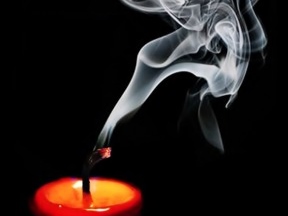I will never forget my first view of Rishikesh, India. The streets were lined with idols shaped in the images of lions, monkeys, and snakes. This was where the Beatles had come in the sixties, looking for spiritual meaning. The place seemed bereft of the presence of God, and as I walked into the city I wondered, What would it take for the will of God to be done here?
The same question comes to mind in less exotic places—the inner city, the college campus, or the affluent suburb. It was no different in Isaiah’s day. What would it take to get the will of God done?
The One Who Gets God’s Will Done
God’s answer was: “Behold, my servant…” (Isaiah 42:1). A servant is a person who gets his master’s will done. If you are a servant, your job description is very simple: whatever your master tells you to do, you do it!
So when God introduces His servant, He is saying, “Let Me tell you about the person who will get My will done in the world.” God’s words about the servant give us a pattern for the kind of ministry that gets His will done and the kind of person He uses to bring His blessing to the world.
God’s servant has remarkable privileges: “Behold my servant, whom I uphold, my chosen, in whom my soul delights; I have put my Spirit upon him; he will bring forth justice to the nations” (42:1).
The servant is chosen, loved, anointed, and sustained, and his calling is to bring justice to the world. Justice is more than getting right decisions in a court of law. The servant’s task is to put things in order and make them as they ought to be—no more corruption, deception, or exploitation.
By any standards, bringing justice to the nations would be an extraordinary achievement. Who could bring this about? And how could this be done?
If you were given the job of bringing justice to the world, where would you begin? Would you call a press conference, initiate an education program, or declare martial law and put the army on the streets? God’s servant would do none of these things. Instead, we are told, “He will not cry aloud or lift up his voice, or make it heard in the street” (42:2).
God’s servant will not promote himself. He will not be the kind of person who tries to dominate everybody else. He will not shout. In fact, the outstanding thing about him will be the quietness of his ministry. God’s will is accomplished, not by angry people who promote their own agendas, but by grace-filled people who seek the good of others.
The Power of Compassion
The will of God does not get done in this world through the genius of spectacular programs or by the glamour of celebrities. The servant’s style is altogether different: “A bruised reed he will not break, and a faintly burning wick he will not quench” (42:3).
When a reed bends, it usually gets trampled on. And if a candle is burning low, you snuff it out and light another one. But God says that His servant will not do that. He will not break a bruised reed, and he will not quench a faintly burning wick.
Perhaps you can identify with the bruised reed. You have been trampled on and you struggle to stand up under a crushing weight that seems too great to bear. Or perhaps you can relate to the picture of a smoldering candle. There was a time when your faith burned brightly, but now you are running out of fuel. Your inner resources of patience, hope, and love seem to be burning low, and the light within you is flickering.
The Scale of the Challenge
The people to whom God sends His servant are not only bruised and broken, but also blind and bound. So the servant faces an overwhelming challenge. He has to “open eyes that are blind” and “bring out the prisoners from the dungeon” (42:7).
If people had the capacity of spiritual sight, it would be relatively easy to flood the world with the good news of the gospel. People would immediately see their need and come to Christ. But the problem God’s servant faces is that even when he describes the glory of God, his hearers are blind to the truth and lack the capacity to respond to it.
If sin were simply a choice, it would be relatively easy to educate people toward better choices. But sin is a power that binds us. Apart from this work of the Holy Spirit, we are all like blind people in an art gallery or prisoners on a tropical island.
Who Fits the Profile?
When God first spoke about the servant, it must have seemed to Isaiah that He was talking about Israel: “But you, Israel, my servant, Jacob, whom I have chosen, the offspring of Abraham, my friend; you whom I took from the ends of the earth, and called from its farthest corners, saying to you, ‘You are my servant’” (41:8–9).
God’s people, Israel, were called to fulfill the role of His servant among the nations. They had been given the light of God’s truth, the law, and the sacrifices. God’s people were to be the means by which His blessing would come to the world.
But God’s people could not live up to their calling. The servant was called to bring sight to the blind and release to the prisoners, but God said, “Who is blind but my servant?… This is a people… trapped in holes and hidden in prisons” (42:19–22). The people who were supposed to bring sight and freedom to others turned out to be blind and bound themselves.
Could Isaiah Be the Servant?
Since Israel was clearly not in a position to fulfill the role of God’s servant, could Isaiah be the means of getting God’s will done? Speaking directly to Isaiah, God said, “You are my servant, Israel, in whom I will be glorified” (49:3). God called Israel to bring light to the nations, but Israel failed, so God was saying to Isaiah, “You are Israel. You are my servant.” But how could Isaiah possibly be the means by which God’s blessing would come to the world?
Isaiah knew that the job was beyond him. When he said, “I have labored in vain” (49:4), he was saying, “There is no way that my little ministry can fulfill the role of the servant!”
But God went even further: “It is too light a thing that you should be my servant to raise up the tribes of Jacob… I will make you as a light for the nations, that my salvation may reach to the end of the earth” (49:6). This was mission impossible! No prophet ever achieved this or even came close. So who could fulfill the calling of the servant and get God’s will done?
Who Would Believe It?
When God revealed the person who would bring love, justice, light, and salvation to the world, Isaiah was so staggered, he feared no one would believe what he had seen. “Who has believed what he has heard from us? And to whom has the arm of the LORD been revealed?” (53:1). “If I tell you what I saw,” Isaiah was saying, “you won’t believe it.”
What Isaiah couldn’t get over was that the servant who would get the will of God done was despised and rejected. Violence was poured out on him, and the servant was so disfigured that people hid their heads in their hands. They could hardly bear to look at him.
Isaiah must have winced as he saw what would happen to the servant on whom the hope of God’s blessing depends: “He was pierced for our transgressions; he was crushed for our iniquities; upon him was the chastisement that brought us peace, and with his wounds we are healed” (53:5).
Then God told Isaiah something that must have made him gasp. “It was the will of the LORD to crush him” (53:10). How could the suffering inflicted on the humble, compassionate servant of the Lord be the will of God? Did this mean that God’s servant would fail? Isaiah must have wondered. But God said: “The will of the LORD shall prosper in his hand” (53:10). God’s servant would bring blessing to the nations. And it would come through his suffering and death.
Jesus is clearly identified in the New Testament as the gentle, compassionate Servant of God. His ministry fulfilled what was spoken by the prophet Isaiah: “Behold, my servant whom I have chosen, my beloved with whom my soul is well pleased. I will put my Spirit upon him, and he will proclaim justice to the Gentiles. He will not quarrel or cry aloud, nor will anyone hear his voice in the streets; a bruised reed he will not break, and a smoldering wick he will not quench, until he brings justice to victory; and in his name the Gentiles will hope” (Matthew 12:18–21).
Opened
Jesus Christ is the Servant who gets the will of God done. He said to His disciples, “As the Father has sent me, even so I am sending you” (John 20:21). Those who know Jesus are to go out into a broken world and show the compassion of Christ. We are to proclaim the truth of what God has done in Jesus, so that people who do not know Him may come to enjoy the freedom that He gives.
Christ sends His servants to all the nations of the earth. As we minister in His name, the blessing of God will come to many people, and Christ will see the fruit of the travail of His soul and be satisfied.








